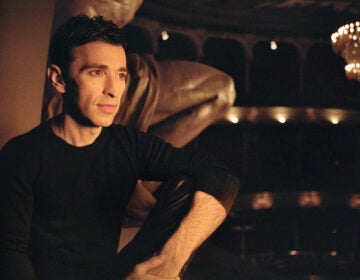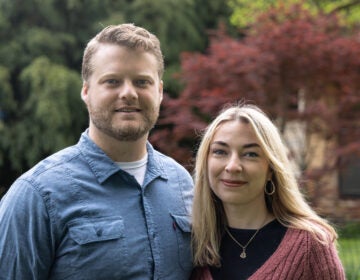Brain-injury survivor completes cross-country ride
Around 11 a.m. Friday, Doug Markgraf pedaled up to the Hospital of the University of Pennsylvania’s front door. He got off the bicycle on which he’d spent the previous 54 days riding cross-country on a mission to raise awareness for traumatic brain injuries and asked the crowd assembled to greet him how they were doing.
When Markgraf was instantly asked the same, he acknowledged he was “a bit tired, but really, really glad I could come back to where this all started.”
The East Falls resident didn’t mean this was where the biking trip started; that was in San Francisco. HUP was the place where he spent two weeks comatose after getting nearly killed in a still-unsolved 2005 hit-and-run. That life-altering event served as the impetus for his trip.
Friday was the first time Doug’s parents were back inside the hospital at which they sat at a bedside not knowing whether they were about to lose a son in years.
After Doug pulled up, his mother Jen had tears in her eyes when recounting a woman who’d suffered a brain aneurism heard Doug’s story just minutes earlier, she asked to pose for a picture with him. That spoke to Doug’s desire to inspire patients who suffer brain injuries, to show them that they can return to action.
“It’s unbelievable. It touches the heart. I can’t even talk about it,” she said as Doug spoke to reporters a few feet away. “It’s so deep that you just can’t even explain it. He’s a miracle. He’s a true miracle.”
His recovery left him wanting to advocate for a cause. Visiting HUP’s Neuro Intensive Care Unit (NICU) was part of that. He visited many brain-injury centers or support groups so he could return to Philadelphia – where he teaches robotics at a charter school – and lobby for better treatment and funding.
HUP opened a new state-of-the-art NICU wing in the years since Markgraf had been there, so he didn’t go to his old room. He met some of the doctors, surgeons and nurses who helped him do so, though.
He questioned neurosurgeons about treatment advances as much as they delved into his recovery. Dr. James Schuster, also a cyclist, recounted the specifics of his case down to the Lancaster Avenue location and style of bike Doug rode at the time.
“The last time we saw you, you were wearing a very similar outfit,” Schuster said, telling Doug that he’d wondered whether they retrieved his Cannondale bike he saw in news stories. “You’re a testament to why we do this. It’s great. It’s awesome.”
Dr. Eileen Maloney-Wilensky, director of the Neurosurgery Clinical Research Division, said, “I don’t think that people realize how great this makes us feel.” A nurse who didn’t treat Doug but joined his tour said, “We’ll talk about this for a very long time.” It’s not every day they see patients return.
Doug was shown his brain scans and told about advances which allow them to be taken in the patient’s room as opposed to taking them to another floor as had been the case in the past.
As that was going on, his parents talked about how Doug wanted to get back on the bike about a year after almost dying on one to the point where he said he wanted back on the Drexel cycling team. His father Dan recalled one teammate who opposed the move unless Doug had parental clearance.
“I allow it,” Dan recalls telling the team. “It’s Doug’s life. He’s going to do it either way.”
As it was, he didn’t wait long to get back on a bike after the NICU visit. On Saturday night, Doug held a fundraiser for the Raisin’ Hope Foundation at Billy Murphy’s Irish Saloonery. There, he spoke about how he sometimes rides past the scene of the hit-and-run. He also noted he will continue to advocate, possibly riding a different route next summer.
Then on Sunday, to bring the trip to a fitting end, he rode from East Falls to Toms River, and then from Toms River to the Atlantic Ocean. After that, he got a lift back to Philly via car since he has to head to the classroom to get ready for a new school year today.
“I don’t just want to send out good vibes. I want to change things as much as I can change them,” he said, referring to better care and insurance coverage for TBI recovery programs. “Brain injury is relevant and it’s something that we need to talk about.”
WHYY is your source for fact-based, in-depth journalism and information. As a nonprofit organization, we rely on financial support from readers like you. Please give today.




